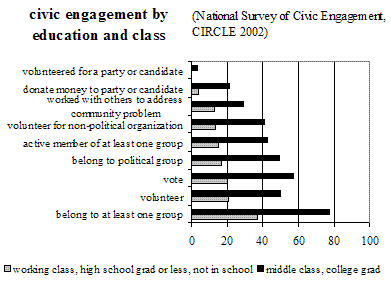┬ź worth reading | Main | thickening to empire ┬╗
April 3, 2006
political equity
Although some degree of economic inequality is inevitable or even desirable, all citizens should be equals before the law and government. However, in practice, people with more money and education tend to be more politically effective and to dominate civil society. In the United States, there are striking correlations between most forms of civic engagement and individuals' education and wealth. The following graph shows self-reported levels of participation for those who say they belong to the working class and who have a high school diploma or less, versus those who call themselves middle class and hold a college degree or more. The more privileged group is at least twice, and often five times, as likely to participate in all categories:
In principle, there could be an equitable political system with low levels of participation, so long as every demographic group and social stratum participated at the same rate. Then the participants would be a representative sample of the whole population. There are even democracies in which the poor and weak outvote the powerful: for example, in India, where the "untouchable" or Dalit class has higher turnout than the high-caste Brahmins. That is because the poor outnumber the wealthy in India, and political parties have persuaded them that they can benefit tangibly from capturing the state by voting. It seems relatively difficult to mobilize the least advantaged in a country like the United States, where the median family is reasonably well-off and well-educated, and the poor form an electoral minority, incapable of winning elections even if their turnout is high. Also, a sophisticated, media-rich society with a strong independent voluntary sector and a high degree of political freedom rewards people who have resources-Śmoney, skills, energy, or time--to contribute.
Thus the best method for increasing political equity in a country like the United States is to raise the total number of people who participate in politics and civil society. When total numbers rise, the poor and poorly educated are better represented. This is not a utopian idea. Voter turnout among male citizens reached 81.8 percent in the 1872-Śmuch higher than it is today. There is no essential reason why basic forms of participation such as voting couldn't return to those levels.
April 3, 2006 11:37 AM | category: none
Comments
Hey Peter,
I think I'm missing something really simple. I don't quite understand how raising the total number of participants would increase the poor and poorly educated relative to the wealthy and highly educated. If the total number increased, presumably along the currently unequal mobilization patterns, wouldn't the breakdown in representation reproduce itself?
What am I missing?
Joe
April 3, 2006 2:23 PM | Comments (2) | posted by Joseph Sinatra
Joe,
You're right that an increase in overall participation doesn't logically imply greater equality, because the new participants could be well off. However, in practice, when you start with a very skewed sample and you bring in new people, they tend to be less elite. For instance, overall voter turnout rose sharply in 2004, and the biggest proportional increases were seen among traditionally under-represented groups such as youth (and non-college youth even more than college students).
April 3, 2006 2:56 PM | Comments (2) | posted by Peter Levine
